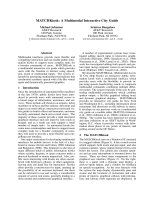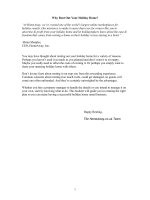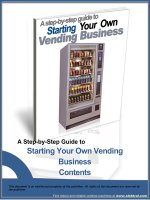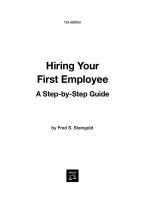Renting your holiday home a step by step guide pptx
Bạn đang xem bản rút gọn của tài liệu. Xem và tải ngay bản đầy đủ của tài liệu tại đây (215.05 KB, 31 trang )
Why Rent Out Your Holiday Home?
“At HomeAway, we’ve created one of the world’s largest online marketplaces for
holiday rentals. Our mission is to make it easier than ever for owners like you to
advertise & profit from your holiday home and let holidaymakers know about the ease &
freedom that comes from renting a home on their holiday versus staying in a hotel.”
-Brian Sharples,
CEO, HomeAway, Inc.
You may have thought about renting out your holiday home for a variety of reasons.
Perhaps you haven’t used it as much as you planned and don’t want it to sit empty.
Maybe you really need to offset the costs of owning it. Or perhaps you simply want to
share your amazing holiday home with others.
Don’t let any fears about renting it out stop you from this rewarding experience.
Common concerns about renting (too much work, could get damaged, no guests will
come) are often unfounded. And they’re certainly outweighed by the advantages.
Whether you hire a property manager to handle the details or you intend to manage it on
your own, start by knowing what to do. This booklet will guide you in creating the right
plan so you can enjoy having a successful holiday home rental business.
Happy Renting,
The HomeAway.co.uk Team
1
Table of Contents
Getting Started 3
—Lizzie, Pyrenees Orientales, France 3
Setting Goals 4
Following Regulations 5
Getting Involved 6
Hiring Helping Hands 7
Preparing for Guests 8
Marketing your holiday home 10
–Larry, Florida, USA 10
Finding Guests 11
Targeting Holidaymakers 12
Listing Advert Contents 13
Writing the Headline 15
Describing Your Home 16
Taking Photographs 17
Setting Rental Rates 18
The Rental Process 19
—Tansy, Normandy, France 19
Responding to Enquiries 20
Taking Reservations 22
Collecting Payments 23
Receiving Deposits 25
Handling Keys 26
Leveraging Word-of-Mouth 27
Rental Process Review 28
12 Keys to Success 29
Advertise on HomeAway.co.uk 30
Useful Resources 31
2
Getting Started
“I wanted a new life in a wonderful climate, but I needed an income. The south of France
beckoned and I discovered my lovely farmhouse with potential for rental units on my
second visit. Now I have the sunshine, the quality of life and the income.”
—Lizzie, Pyrenees Orientales, France
3
Setting Goals
You may not think of your holiday home as a business, but when you set it up as a rental
property, you’ve just entered into a potentially profitable business endeavour.
As with any kind of business, it’s important to set clear goals. What would you like to
accomplish by renting out your holiday home? Your answer might seem simple: Make
money by finding guests who will pay you to stay in your home. To succeed in
accomplishing this, first spell out your goals in detail and follow this with a plan for
achieving them.
Following these guidelines will help you get started.
Determine Objectives
Decide how many weeks in a year you would like to use your home yourself and how
many weeks you would like to have it rented out.
Next, determine your financial objectives. Do you hope to have your rental revenues pay
for all of the expenses associated with owning your holiday home? Do you want to offset
a portion of your costs? Do you want to make a profit? If so, how much?
Understanding the financials
If your goal is for your rental revenue to pay all of the expenses associated with owning
your property, including the mortgage and overheads (bills), then the below example may
help you to structure your rental rates.
Example (based on 12 month period):
If you own a villa with a monthly mortgage of £1000 and then rent your villa for £1000
per week, you would only need to rent your property for 12 weeks to break even on your
mortgage payments. You may wish to consider the overhead costs such as bills and
therefore consider renting the property for more than 12 weeks to absorb such costs.
For more information on rental revenue try the HomeAway.co.uk free rental income
calculator to see how much income potential your property has.
www.HomeAway.co.uk/calculator
4
Following Regulations
When starting out with holiday rentals, make sure your second home business complies
with the laws and regulations of your city, town, region and country.
Rules regarding short-term lets?
Before you begin renting, check the law regarding short-term lets that is in force not just
for the local area, but also for the building or complex. For example if you own a flat, or
have an apartment on a resort or condo-style complex, there could be a ban on short lets.
Be sure to also stay up to date with any proposed changes that may affect your business.
To research the status of short-term rentals, check your lease if you have one, contact the
local town or city hall, or other appropriate governing body for your region or borough,
search online for information about your market, and consider contacting other owners
renting in your immediate area for advice.
Business Licenses and Permits
Many areas require holiday rental owners to apply for a business license or permit to rent
homes on a short-term basis. Consult the appropriate local officials for clarification and
more information.
Health and Safety Regulations
In some markets, holiday rental homes have to follow the same basic safety requirements
as long-term rentals (e.g., sprinkler systems, fire extinguishers, deadbolt locks, pool
cover, energy performance certificate, etc.) and may also be required to complete safety
inspections. Some areas and countries also have specific rules and regulations around
health issues, most commonly involving linen sanitisation, well-water testing, and pool
and spa maintenance.
5
Getting Involved
After making the decision to rent your home, you must determine how involved you
would like to be in the rental process. Renting your holiday home short-term requires
time, effort, and dedication to succeed.
Luckily, you don’t have to do everything yourself. Most holiday rental owners either
choose to employ a property management company or set up a “rent by owner” situation.
Tasks Involved in Renting Your Holiday Home
Advertising your home
Responding to enquiries
Taking reservations and payment from guests
Handling guest requests and complaints
Hiring service providers (housekeepers, handymen, etc.)
Scheduling housekeeping before each holiday rental
Ensuring maintenance issues are dealt with
When to Use a Property Manager
Consider hiring a property management company if you don’t have the time or desire to
successfully run your holiday rental yourself. You’ll find property management
companies in most holiday rental markets. They can manage every aspect of renting your
home, for a commission, of course.
When to Rent by Owner
Consider managing your rental yourself if you—
• want complete control over who rents your property
• want complete control over finances and income related to your property
• want to avoid paying circa. 20-30% commission to a management company
Remember, there’s no right or wrong way to rent your holiday home. Ultimately, your
choice to hire a property manager or not is determined by your desired level of
involvement.
6
Hiring Helping Hands
Property Management Company
If you don’t have the time to manage your rental yourself, consider hiring a property
management company to handle everything for you. In exchange for their services, they
typically charge a commission, which can range from circa. 20% to 30% of the rental
income.
Before hiring a property manager, verify if the company’s staff will—
Advertise the property both locally and internationally?
Guarantee a minimum level of bookings?
Interview potential guests to make sure they are suitable?
Inspect the property before and after each rental and do an inventory check?
Welcome the guests into your property?
Organise repairs and maintenance, and provide receipts for all expenditures?
Housekeeper or Cleaning Service
When renting by owner, handling cleaning issues from a distance will likely be your
biggest challenge. It’s critical to find a housekeeper or cleaning service you can count on.
Start by visiting your holiday home and talking with the housekeepers cleaning your
neighbours’ holiday homes. You can always contact other owners in your area who are
on our site to find out how they do it.
Maintenance Person or Handyman
Consider hiring a maintenance person or company to oversee your property on a
continual basis. This works particularly well for people who live far from their second
home and can’t visit more than once or twice a year.
Solicitor
Before renting your home for the first time, hire a solicitor familiar with the holiday
rental market who can advise you on the laws in the area of your holiday home. Have the
solicitor look over all your rental agreements and policies to make sure they comply with
local laws.
Accountant or Tax Adviser
Similarly, hire an accountant who can advise you about bookkeeping procedures and tax
implications for holiday rental owners.
7
Preparing for Guests
Your holiday home is most likely furnished and decorated. However, when you begin
renting it out short term, it’s important to find a balance between your convenience and
your guests’ comfort.
First, walk through your holiday home and remove any irreplaceable items, for example
items with sentimental value, or unique antiques or souvenirs. Then create a lockable
closet for storing the personal affects and supplies you want to keep just for your personal
use. Make sure the space throughout your home is relatively free of clutter and personal
items.
The Kitchen
When it comes to the kitchen, guests appreciate convenience. Your kitchen should be
equipped with enough plates, glasses and cutlery for double the number of people that
you sleep. Guests also appreciate conveniences like a kettle, toaster, coffee maker,
adequate cooking utensils, and a sufficient dining space.
The Bedrooms
See that your holiday home has quality, ample bedding: at least two sets of high-quality
sheets for each bed, pillows with pillow protectors, extra blankets, and mattress
protectors. Also provide an alarm clock and reading lamp on a bedside table in each
bedroom.
The Living Area
Make sure your living area has comfortable seating for at least the number of people that
you sleep and a TV large enough for guests to watch from across the room. Provide at
least basic channels, a DVD player, and cards and board games for rainy days if you can.
The Bathrooms
Guests expect the bathrooms to be spotless and demand quality towels. At a minimum,
aim to provide:
2 bath towels per guest
2 hand towels per guest
4 washcloths per guest
hair dryer
The Extras
When equipping your holiday rental, be aware of why guests want to stay in a holiday
home instead of a hotel. Consider providing these items:
high-speed wireless Internet
books, games, videos
first aid kit
Other facilities that may appeal to guests include:
video game systems
pool or other games tables
8
play areas and/or toys for children
equipment appropriate to your area, e.g. bikes for a country home, inflatables for
the beach, a sledge for ski properties
BBQ/outside dining areas
Hot-tub or Jacuzzi bath
9
Marketing your holiday home
“Your own web site is not hard to create, but does take much time, effort and expense to
promote. A great start to advertising online is an immediate subscription to
HomeAway.co.uk.”
–Larry, Florida, USA
10
Finding Guests
After you’ve prepared your holiday home with appropriate décor and facilities for your
target guests, it’s time to get your property out there for renters to find. In the past,
holiday homeowners relied on print advertising like newspapers and magazines, plus
word-of-mouth to book their holiday homes.
Luckily, you no longer need expensive print ads to find guests. The Internet offers cost-
effective and easy-to-use websites that can drive potential renters to your holiday home.
Portal Websites*
The most common Internet advertising option for holiday rentals is a portal or holiday
rental website. Portal websites typically focus on connecting holiday homeowners and
holidaymakers. They range in size from local or regional sites with only a few hundred
properties to large-scale worldwide sites like HomeAway.co.uk. Portal websites tend to
be inexpensive (£150-£300/year) and more cost-effective than traditional print
advertising. By way of comparison, for £249 per year, you could reach 50 million visitors
on HomeAway.co.uk, or you could pay much more for a one-off advert in a newspaper
with limited shelf-life.
Speciality Websites
Speciality websites cater to the interests of particular groups of people. Some list holiday
properties specifically and some do not. Speciality websites include Chamber of
Commerce websites, hobby-specific websites like golf or scuba diving, and travel
websites targeting groups such as seniors or pet owners.
Personal Websites
While it’s not necessary to create a personal website to rent your holiday home, some
owners do so to complement their portal website listings. It allows you to provide extra
photos and detailed information that can help seal the deal with potential guests.
* This type of website tends to produce the most enquiries and bookings.
11
Targeting Holidaymakers
Before you begin advertising your holiday home, take a moment to think about your
target guest. HomeAway.co.uk conducts ongoing market research to better understand
what holidaymakers are thinking when searching for a holiday rental.
Most start their search with these criteria in mind:
Location/Proximity to Attractions
Often travelling guests are looking for a property that is close to specific attractions. In
your description, instead of writing “near tourist attractions, shopping, and restaurants,”
list the exact distance from the home itself to specific attractions.
Price
Most holidaymakers search with a certain budget and price range in mind. Make sure you
state your prices clearly and they’re easy to find in your listing.
Size of Property
Clearly state the size of your property and maximum number of guests it can
accommodate. Guests specifically want to know about your bed setup, as well as the
seating available in your living area and dining room.
Preferred Dates
Many holidaymakers base their holidays around work and school calendars, which can
make their timing inflexible. Keep your availability calendar up to date to attract
holidaymakers looking for specific dates, even at the last minute.
Remember, most holidaymakers are willing to compromise on at least one of these four
factors, so don’t lose out by limiting or omitting this crucial information in your listing.
12
Listing Advert Contents
Most holiday rental portal websites provide holidaymakers with a clear layout of the
information they need to make a selection. Each HomeAway.co.uk listing template
features a headline, a thumbnail photo, a full description, 24 property photos, a rental
rates table, an interactive map, a facilities table, an availability calendar, and guest
reviews.
Headline
On HomeAway.co.uk, your headline shows up at the top of your listing and in the
summary box for all search results. Because your property’s headline is your first chance
to grab guests’ attention, make it as specific as possible. Hint: this helps in search engine
rankings as well.
Thumbnail Photo
A thumbnail photo of your holiday home also shows up in the property summary on all
search results pages and at the top of your listing. Be sure to select a unique photo that
stands out among other listings in your area.
Full Description
Your property description on HomeAway.co.uk is a 100-word summary of your holiday
property. Make sure it paints a clear picture of your home and all the extras it offers.
Property Photos
Your HomeAway.co.uk listing can display up to 24 photos of your holiday home.
Showing exceptional photos results in more enquiries and ultimately more bookings. If
you’re not comfortable wielding a digital camera and uploading photos, ask a friend to
help or hire a professional photographer.
Interactive Map
The interactive map shows a pin-point location of your property location. Holidaymakers
often refer to the map for guidance. Owners can also restrict the level of zoom on their
property.
Rental Rates Table
Price is one of the most important factors when choosing a holiday rental, so it’s
important that site visitors can easily determine your rates. The HomeAway.co.uk rental
rates table allows you to include nightly, weekly and monthly rates for each of your rental
seasons.
Facilities Table
Some holidaymakers prefer to browse the facilities rather than read the property
description. On your HomeAway.co.uk listing, it’s easy to check off boxes to show
holidaymakers which facilities you include, plus add information about other facilities
featured in your home.
Availability Calendar
13
Holidaymakers need to know when your home is available, especially those wanting to
book specific dates. The easy-to-update availability calendar on HomeAway.co.uk keeps
them informed.
Guest Reviews
Your past guests can leave reviews about your home using the HomeAway.co.uk
Reviews system. Featuring these reviews can make a difference. Guests are more likely
to choose a holiday home that several past guests have favourably reviewed. Once you
have welcomed a guest or two it worth prompting them to leave a review.
Remember, the more complete your portal website listings are, the more comfortable
holidaymakers will feel to ask about – and ultimately book – your holiday home.
14
Writing the Headline
The single most important text in your HomeAway.co.uk listing is your headline. It
appears not only at the top of your advertisement, but also in your property summary that
shows up in HomeAway.co.uk indexes and search results.
Like the headline of a print ad, your property headline uses a few well-chosen words to
generate interest in your holiday home. Yours should be more than good; it should be
GREAT.
What to Include in the Headline
Use words that clearly depict your holiday home and its position in your market. You
could describe your property type (e.g., cabin, apartment), location type (e.g., beachfront,
city centre), suitability (e.g., pet friendly, perfect for kids), and facilities (e.g., hot tub,
pool, pool table, tennis). Specific keywords like these catch the eye of potential guests
and help your listing show up higher in the Internet search engines.
What Not to Include
An effective headline doesn’t repeat information detailed in your HomeAway.co.uk
summary box (that is, location, number of bedrooms and bathrooms, and the number of
people it can accommodate). Avoid using local jargon or abbreviations; don’t assume
your guests are familiar with the area.
Don’t Ever Copy Another’s Headline
Never copy another listing’s headline. Your headline’s uniqueness will attract interest in
your listing. If the same wording appears with another property, neither will stand out.
Bad headline: “Wallaby’s Paradise”
Good headline: “Cozy Beach House Near Anini Beach”
GREAT headline: ““Luxury Beachfront Home with Pool, HDTV, Spring Break Open”
IMPORTANT NOTE: In accordance with CAP (Committee of Advertising
Practice) Guidelines from the ASA (Advertising Standards Authority), all online
advertising must contain an accurate and not misleading description of products (in
this case your property), availability and prices, plus evidence must be held for all
claims of ‘objective substantiation’ (i.e. things that can be proved in some way).
Therefore you should think carefully before describing your property as ‘the best’,
‘luxury’ or ‘beachfront’, for example – could you ‘prove’ this if challenged? This
also applies to measurements and distances, so don’t put ‘just minutes from the
beach’ if in reality it’s a good 10+ minute stroll. For full details and links to these
guidelines, click here.
15
Describing Your Home
When browsing HomeAway.co.uk, potential guests focus on different sections of a
holiday rental listing. Chances are most will read the property description, a 20-second
opportunity to convince someone to stay at your holiday rental property.
What details would they want to know?
Be Imaginative When Talking to Your Guest
Describe your home in a way that helps them imagine staying there. How do you write
that way? Instead of “The pool is heated year-round,” write “You'll love our pool: we
keep it at 78 degrees all year long.”
Write Clearly and Concisely
Your advertisement will be read by people of all nationalities and English language
proficiencies. Put your description in clear, complete sentences; avoid obscure
abbreviations and local jargon.
Sell Your Property, Not Your Area
By the time holidaymakers find your listing on HomeAway.co.uk, they’ve likely decided
to stay in your holiday area. It’s your job to convince them to book your holiday home.
Hint: You can always highlight the area in the “Location” section of your
HomeAway.co.uk listing.
Keep in mind these three types of shoppers: One that only looks at photos, one that
scans the listing for certain words, and one that reads the written descriptions completely.
For this reason, make each of these areas in your listing as strong as possible.
What to Include in Your Description
Property type and size
Specific bedroom info and bed setup
Major facilities
Suitability for certain groups of holidaymakers
Property highlights or USPs (unique selling point)
Proximity to key local sights and attractions
Correct spelling, grammar, and punctuation
16
Taking Photographs
You have 30 seconds or less to grab the attention of anyone who views your holiday
rental property page. Will they read through yours or move onto the next listing? This
distinction is simple: The more quality photos you have, the more interested viewers
become, the more likely they’ll enquire via email or phone.
Did you know that holiday rental properties with more than 4 photos get twice as many
enquiries as listings with 4 photos or fewer?
Use a Digital Camera
Digital cameras produce high-quality photos that look great on the web. You can edit the
photos on your computer and easily upload them to HomeAway.co.uk. Hint: You can
take hundreds of photos and easily delete the ones you don’t like at no cost.
Stage Each Photo
Help holidaymakers imagine the feel of staying in your home by “setting the scene” well.
Before taking each photo, remove unnecessary clutter, straighten magazines on the coffee
table, smooth all bedspreads, fluff all pillows, and turn off the television. Add warm,
welcoming touches like a bowl of fruit or a vase of flowers.
Light for Success
Lighting is the single most important factor in taking good photos. For the best results,
use the natural light available by opening curtains and blinds, turn on all indoor lights,
and take photos both with and without the flash turned on to see what looks best.
Note: Remember, photos come with copyrights. If you’re using a photo you didn’t take
yourself, get proper permission from the photographer and/or publication where you
found the photo.
Must-Have Photos
Exterior of home, building, or complex
The view from the home
Any outside areas
Living area
Kitchen
Master bedroom
Additional bedrooms
Pool or hot tub if available
17
Setting Rental Rates
The number of enquiries and bookings that you receive will be impacted by how you set
your rental rates, so be sure to price your property competitively compared to other
properties in your area.
Research Rates in Your Market
Check the pricing of similar holiday rental properties on sites like HomeAway.co.uk. Pay
attention to what facilities the properties offer, their proximity to tourist attractions, and
how your homes compare.
Set Nightly, Weekly, and Monthly Rates
Guests like to see rental rates during different increments of time. In markets primarily
priced by the week, many owners choose a nightly rate that is 1/5th to 1/6th of their
weekly rental rate. Conversely, in nightly rental markets, homeowners often multiply the
nightly rate by 5 or 6 to get a weekly rate. Off-season monthly rates are generally the
same amount as one peak week.
Make Your Rental Rates Clear
If potential guests can’t easily find the rental rate for the dates they want, they’ll move on
to the next listing. So when setting rates, be sure to quote exact dates for the rental period.
Avoid using vague terms like “peak season” because prospective guests may not be
familiar with the seasons in your area.
Decide on a Minimum Stay
During the busiest months for your rental market, a 1-week minimum stay may be
typical. Outside the peak season, lowering your minimum stay to 3 nights will target
weekend guests. Be sure to check your area’s short-term rental regulations to see if a
minimum stay is mandated. In general be flexible as you can to encourage the most
interest in your property.
18
The Rental Process
“We really enjoy the buzz of the whole rental process, from selling the weeks and filling
the season to meeting the guests who come to stay and actually add another dimension
to your life.”
—Tansy, Normandy, France
19
Responding to Enquiries
When holidaymakers find your holiday home on a website like HomeAway.co.uk, they
will likely contact you in one of two ways:
Email. About 90% send enquiries through the form located at the bottom of your
listing. These enquiries are routed to your email address or can be viewed by
logging into your HomeAway.co.uk account.
Phone. About 10% of holidaymakers call to enquire about availability or book
your home immediately. Be sure to list a number you can answer throughout the
day, and consider listing an alternate number as well.
SMS. You can also choose to set up SMS notifications whenever you receive an
enquiry – make sure you enable SMS text alerts under ‘contact details’ when
creating or editing your advert.
How to Convert Enquiries into Bookings
Check your email often. This may sound like a no-brainer, but you would be surprised
how many people only check emails once a day or even once a week. At minimum, check
email first thing in the morning, at the end of the workday, and before going to bed. Also,
if you can, sneak a peek at lunchtime, too.
Reply immediately to enquiries. Be detailed and friendly in your reply. Quote rates
including taxes and fees. Confirm exact check-in and checkout dates that you have
available. Tell them to call you if they have additional questions.
Include a signature line. Make sure they know how to contact you by including an
automated signature with your name, phone number(s) and link to your property page.
Hint: Quoting your HomeAway.co.uk property number helps potential guests to find
your property online.
Pick up the phone and call. When people enquire, instead of emailing a reply, pick up the
phone and call. If they’ve list a phone number on the enquiry form, then a call is
expected. Studies show that the first person to call is most often the one holidaymakers
rent from. Owners know that those who call rather than email have a significantly higher
conversion rate than those who only email.
Return phone messages immediately. When enquirers call and leave you messages, call
back! Don’t blow a potential rental by not returning calls in a timely manner. Make it a
priority.
Follow up via phone. Give enquirers a follow-up call a few days after your initial
correspondence to see where they stand in their planning. This demonstrates a proactive
attitude which is a reassuring trait holidaymakers looks for when renting a property
privately.
20
This can also be the ideal time to negotiate a rental rate that is fair to both you and the
holidaymaker and get the stay booked.
Follow up via mail. As soon as you receive an email enquiry, reply with a confirmation
of status (available or booked), answer specific questions, and offer to send a follow-up
pack that includes:
booking deadlines
payment conditions
arrival and check-out times
miscellaneous information
21
Taking Reservations
Screening Guests
Properly screening your guests is your best insurance policy against loss. It’s
recommended that you talk to your potential guests on the phone before accepting their
booking. It is perfectly acceptable to ask potential guests questions to determine if they’ll
be suitable guests. Sample questions: “How many people are in the party?” and “Are
there any children or pets?” In the process of talking, let them know your holiday rental is
your second home. This makes them feel more comfortable renting your home and
encourages them to take better care of it.
Taking Payment
A reservation is confirmed when the deposit payment is received. Although you can
require guests to send cheques or bank transfers for deposits and payments, you can
increase your bookings by conveniently accepting credit card deposits and payments.
Put Everything in Writing
To protect both yourself and your guests, put all agreements in writing. Send your guests
a copy of your rental rules and billing confirmation. Do NOT accept deposits without
having signed copies of your Booking Confirmation and Rental Rules documents in hand
(faxed or scanned signatures are acceptable). You can see an example of both documents
at www.HomeAway.co.uk/resources
Your Rental Agreement
Be sure to include the following:
Your contact information and the address of the holiday rental property
Pet and smoking policies and restrictions
Age and maximum occupancy restrictions
Check-in and check-out days / dates and times
Total amount due including all taxes and fees
Payment schedule for deposits and rental payments
Cancellation policy with detailed penalties for cancellation
Check-out policy: your expectations of the guests upon departure
Provisions for refund of the security deposit
22
Collecting Payments
Reaping the financial benefits of renting your holiday home doesn’t have to be
complicated as long as you establish clear policies regarding monetary transactions.
It is possible potential guests may feel apprehensive about transferring funds to someone
they’ve never met. Presenting them with solid and concise financial policies will help
ease their concerns and minimise potential aggravation for you.
These payment methods are commonly available: Credit cards, PayPal, personal cheques,
and bank transfers.
Credit Cards or PayPal
Holidaymakers commonly expect to use a credit card for travel so if you don’t accept
them, potential guests may look elsewhere. Accepting credit cards gives you flexibility
and the benefit of immediacy. No more waiting for the check in the mail to verify that a
booking is solid. You can take deposits, final payment, and security deposits over the
Internet and also process refunds.
HomeAway.co.uk offers an online payment service. You can customize your own
payment schedule and send email notices to request payments. Your guests can pay
online through our secure service using Visa and MasterCard.
Personal Cheques
If you accept payments by personal cheque, cash the cheque immediately. Make sure you
give the cheque ample time to clear before giving that guest access to your property.
Bank Transfers
You can offer direct payment from one recognised bank account to another account.
Payment is immediate and convenient; funds are deposited directly into the seller’s
account. (Note: bank-to-bank wire transfers are different than Western Union because
they are traceable to an individual.) In order to give holidaymakers confidence you
should ask them to send money to an account in the same name as the name on the
website.
AVOID THESE PAYMENT METHODS:
Money Orders and Cashiers’ Cheques
Beware. These are not convenient payment methods for your guests and are favoured by
scammers.
Instant Cash Wire Transfers
HomeAway.co.uk advises against sending or accepting payment by untraceable wire
transfers through services like Western Union or Moneygram because this method is
commonly used by scammers and thieves.
23
If you ever receive an email you think could be a scam please do not click on any links,
and contact our Customer Service Team online or by phone 0208 827 1971.
24
Receiving Deposits
Booking Deposit
The booking deposit is a specific amount of money that is collected at the time of
booking, which validates the Rental Agreement.
Regardless of how far off your guest’s arrival date is, it’s critical to request a booking
deposit within 3 to 5 business days of the booking (or immediately by credit card). This
booking deposit can automatically convert into a security deposit. A security deposit is a
certain amount of money (usually above and beyond the rental costs and fees) that the
owner holds until after the guests have left the property.
Payments
Many homeowners break the payment up into two equal instalments: 60 days and 30 days
away from their arrival. Receiving the first payment 60 days prior to the arrival date gives
you ample time to get another renter due to cancellation or lack of payment. However, if
it’s a last-minute reservation, ask for full payment at the time of booking. Typically you
collect the outstanding amount 14 to 30 days prior to the rental date.
Final Balance
Typically you collect the outstanding amount 14 to 30 days prior to the rental date. This
provides time for funds to clear the bank before you send directions, keys, or lockbox
codes.
Bottom Line: For security reasons don’t give directions or keys to your guests until they
have paid in full.
Guidelines for Collecting Security Deposits
• Many owners require a minimum security deposit of £200 or 15% of the total
rental, whichever is greater. However if you have lots of valuable items or high-
end equipment or furnishings in your property, you may wish to increase this
• Process all deposits right away. If accepting them by cheque, cash it immediately.
Bounced checks signal trouble. If a cheque bounces please contact our Customer
Service team immediately.
• Only return deposits after your property has been inspected after check-out.
• Be sure to comply with laws governing how deposits are held. Be sure to inform
guests about your deposit refund policy and expectations.
25









